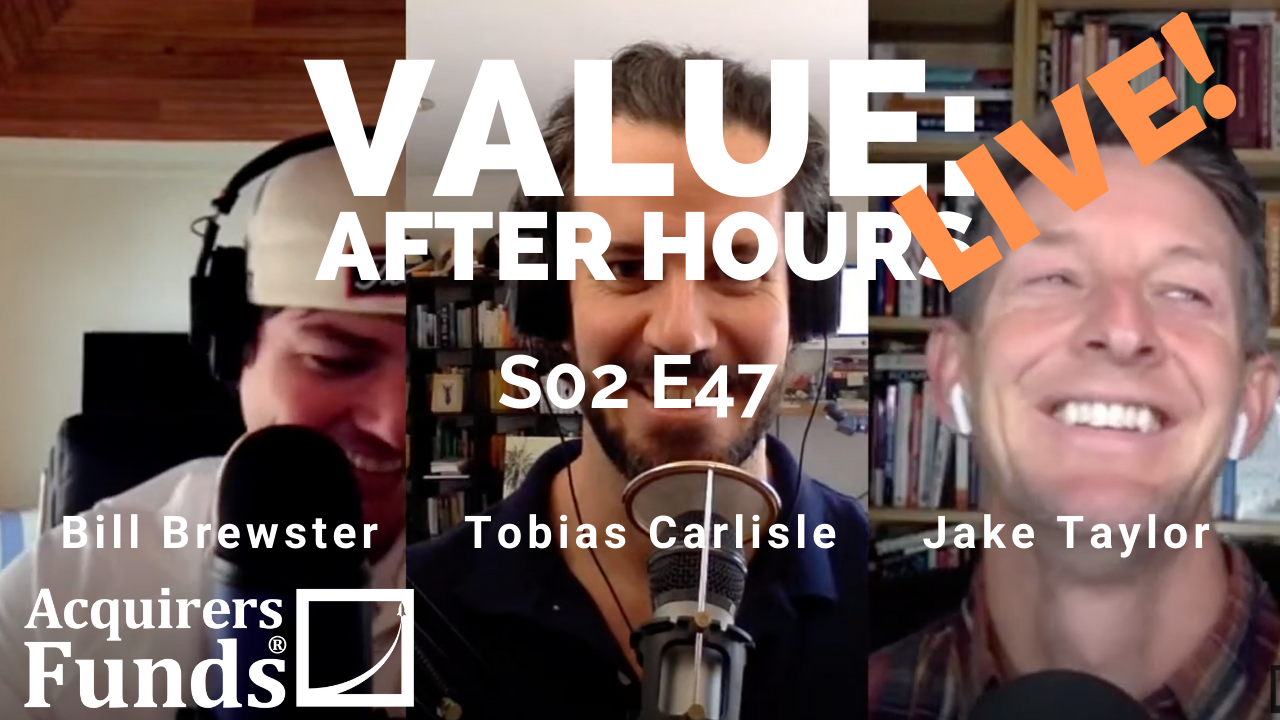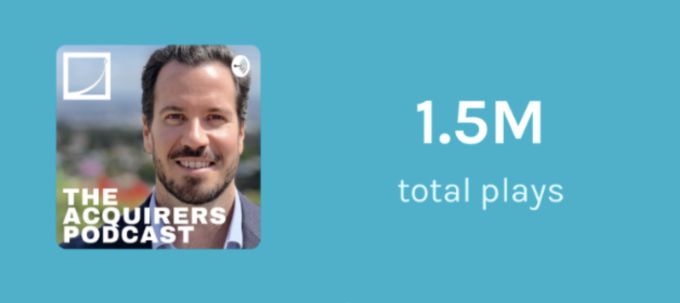During their recent episode of the VALUE: After Hours Podcast, Taylor, Brewster, and Carlisle discussed why Investors Should Be Thankful. Here’s an excerpt from the episode:
Jake: All right. It being Thanksgiving in the US, I thought it would be fitting for us to go through some of the reasons to be thankful. And I tried to make it more investment-related just because that’s what the only topic that we’re any good at talking about. So, without further ado, the first thing is August 2000, the SEC comes out with this ruling called Regulation Fair Disclosure. And so, Reg FD, as it’s known more colloquially, really leveled the playing field on information especially for us, smaller investors. What a gift for us now that we get the same information as everyone else, for the most part, and really cleaned up a lot of the backdoor gossip numbers that previously existed before that. So, that’s something to be thankful for. And really what it does is, it shifts a lot of how you skin this cat to the analytical abilities and the behavioral abilities as opposed to purely the information flow.
Tobias: When was FD introduced?
Jake: 2000.
Tobias: 2000, okay. Was that in response to all of the dotcom pumping? Was that the reason for that?
Jake: I don’t know what exactly precipitated it. But it was long overdue.
Tobias: What they’re doing before then? They just get the analysts in a room and they talk to the analysts? And so, you needed to be connected to a bank that had an analyst.
Jake: Right. So, they would whisper numbers about what the quarter was going to look like and tell them before they would tell anyone else. There was this cycle of, “You cover this company, but your bank also happens to be the one who gives us money for things. We have to treat you right, and then you have to treat us right, and we’re all in this together.” And that broke up a lot of that coziness.
Tobias: You’ve got to sell out security, so you’re always going to have a buy on your securities for your clients, even though– but it still goes on. You get these preposterous price targets and things on, companies because they got some inventory they need to shift.
Jake: That is true. All right. Number two, things to be thankful for, commission-free trades. I mean, this really–
Bill: No.
Jake: Yeah.
Bill: Nope. Fuck that.
Jake: If you use it right–
Bill: Nope.
Jake: -it’s a tool just like anything else.
Bill: Nope. Next.
[laughter]Jake: All right. What’s your argument against that, if you use it correctly, and you’re not– it just overtrading?
Bill: Everybody’s overtrading. I fundamentally disagree with reducing [unintelligible [00:27:09].
Jake: No.
Bill: Okay. Well, I would argue if you long term, the commission doesn’t matter.
Tobias: Also cost, still expensive.
Bill: [crosstalk] percentage and total stuff, it’s like– [crosstalk]
Jake: It has made my life much easier as in managing other people’s accounts to not have to worry about commissions and especially on some smaller accounts, where I’m like, “I don’t want to incur this friction for smaller repositioning of things.” It’s a godsend, it’s great.
Bill: Well, I’m thankful for the ability to disagree with you and still remain friends.
Tobias: Well, the check that I don’t like writing is the one that goes to the IRS at the end of the year, or the one that goes to California.
Bill: No doubt.
Jake: Yeah. Listen, like anything, these all tend to be tools that can be used for good or evil, like a scalpel. All right, number three, ETFs. I think it’s amazing the ability to dial in the exposure and the flavor that you want in an increasingly fragmented rainbow of exposures. If you are trying to get a certain whatever it is, it’s a country or an industry or a valuation, or whatever it is, you can get a basket of things that you could never get before that would have been such a pain in the ass to put together on your own. I think that is actually like a really amazing thing as a tool for us to use.
Tobias: Yeah. It makes sense when they’re thematic and they’ve got to keep on changing the exposures and you don’t get a lot of that tax frictions– [crosstalk]
Jake: [crosstalk] –your own account. Yeah.
Tobias: Through to you. Yeah, that’s huge.
Bill: I’m thankful for value ETFs.
Jake: Well, whatever your poison is, there’s probably an ETF for you.
Bill: No, ETFs are legit, those are good. I’m with you on that. No disagreement, sir.
Jake: Thanks, Charlie.
Tobias: Glad we could reunite you guys again.
[laughter]Bill: Yeah. So am I. I thought we were going to derail there.
Jake: Next one, platforms like Twitter and YouTube. I know this is another thing where it can be for good or for evil, like a tool, but the ability to connect with people and ideas and education and three bozos to get on once an hour or one hour a week to go through things like this. Just the ability to do that now at reasonable cost, it’s pretty incredible. It’s something to be thankful for.
Tobias: Dude, I couldn’t agree more that the– I was thinking this morning, what are the chances that you could put together a network like the one that you have on Twitter, in the days before Twitter or Facebook or any of that stuff existed? You could move to New York and you could try to tap into that network there. But the ability to discover new people who know something at the rate that you can do it on Twitter is just unprecedented. I think it’s the best– you can have a team of analysts on Twitter, like there are guys on there who are just absolute killers, who I am absolutely certain know what they’re talking about. You could just about buy without doing any of your own work if you’re comfortable that they were comfortable with something. I’m not advocating– [crosstalk] I’m not advocating for that. But I’m saying that there are guys out there who are–
Back in the day, like if you had to track this person down and you had this, I want to know about semiconductors, now I’ve got to go and find the semiconductor guy and talk to him that semis for– And why is he going to give you the two hours to talk to you? He can put it in his Substack, you can go and read it, you can make up your own mind.
Bill: Shout to [unintelligible [00:30:51] all the time. I couldn’t agree more. I love Twitter.
Jake: Next up, just public markets in general. The idea that there are businesses that we can buy that are world class, and you can get it in a tiny little fraction of it and as a plebe, be able to do this is something that’s truly amazing. I mean, it wouldn’t be hard to imagine a world where everything was a private company, and you couldn’t get access to it, and then what are you going to do? You’re grinding it out at a job, I guess, or trying to figure out another way of getting equity in something. What a gift for us.
Tobias: To be fair, the Romans did trade tax farming contracts, in the whatever their marketplace was called, it just escapes me, but I’m pretty sure the hive mind will know.
Jake: Acropolis?
Tobias: The Acropolis, is that where trade them? That could be right.
Jake: I don’t know, maybe right. [crosstalk]
Tobias: Name another area in Rome. [laughs]
Jake: Although didn’t they tie them also with a lot of the religious places were also the markets. And that was one of the advances of Western civilization was that they– because otherwise, like, they made it holy that way, there was less violence and cheating and things like that, kind of cleaned up the market. Anyway.
Bill: Goldman Sachs would have provided a solution.
Jake: Yeah, exactly.
Bill: Thanks to Goldman. I’m thankful to Goldman Sachs.
Tobias: [laughs]
Jake: I think just the idea that being an investor makes you a more interesting person [crosstalk] in the world, and how it works, sort of that Robert Hagstrom’s– What was it called? Sorry.
Tobias: The Forum
Jake: Forum. Okay.
Tobias: Thank you [unintelligible [00:32:40].
Bill: [laughs]
Jake: So, being an investor making you a more interested person in the world, and trying to figure out how the world works, I think that that’s– Robert Hagstrom talks about it in the Investing, I think, The Last Liberal Art, something like that, and pretty good book. But just that idea that you take a much greater interest in what’s happening around you when you have economic potential of doing something about it.
Tobias: I like that one. I think that it’s a trap there because if you’re interested in geopolitics, if you’re interested in– read The Economist– I used to read the Far Eastern Economic Review, that doesn’t exist anymore. That was great. If you wanted to know who the treasury secretary of Malaysia was, like, I knew that, like just totally useless information. But if you want to be a macro guy, like you probably got to know that kind of stuff. As a value guy–
Jake: You don’t want to take an interest in the world. [laughs]
Tobias: It’s not that I don’t want to take an interest. It’s a double-edged sword. You got to be a little bit kind of careful. You’ve got to curate the information that you put inside your brain a little bit more than if you’re a macro guy, you’ve got to know everything about everything all the time. That’s hard.
Jake: Exhausting.
Tobias: I know nothing about nothing most of the time, and even that’s hard.
Jake: Yeah.
Bill: I think being an investor has made me a lot more interested in humans than I maybe otherwise would have been–
Tobias: Human behavior.
Bill: I think that’s pretty cool. Yeah.
Tobias: Yeah, for sure. There’s no place that you can get a better window into human psychopathology than the stock market.
Jake: Yeah.
Bill: Yeah, and a lot of the money that I made money has been psychological theses more than anything. I actually think that’s a lot of the money that Buffet’s made. Obviously not all, but a lot.
Jake: The other half is sugar addiction.
[laughter]Bill: Yeah, addiction is human.
Tobias: I always think it’s funny when they run– You run some sort of poll, not on Twitter, I’m talking about the ones that are a little bit broader. You run a poll, where you ask people like, what asset is going to outperform over the next 12 months? Is it going to be gold? Is it going to be small-cap equities? Is it going to be EM equities or something like that? And people answer, like, why bother asking? Go and have a look at where this stuff is in the market. That’s how you know what everybody thinks is going to happen over the next period of time. What they tell you and where they actually put their money, those are two completely different places.
Jake: What’s the answer though? What’s going to outperform?
[laughter]Tobias: Small value.
You can find out more about the VALUE: After Hours Podcast here – VALUE: After Hours Podcast. You can also listen to the podcast on your favorite podcast platforms here:
For all the latest news and podcasts, join our free newsletter here.
Don’t forget to check out our FREE Large Cap 1000 – Stock Screener, here at The Acquirer’s Multiple:




